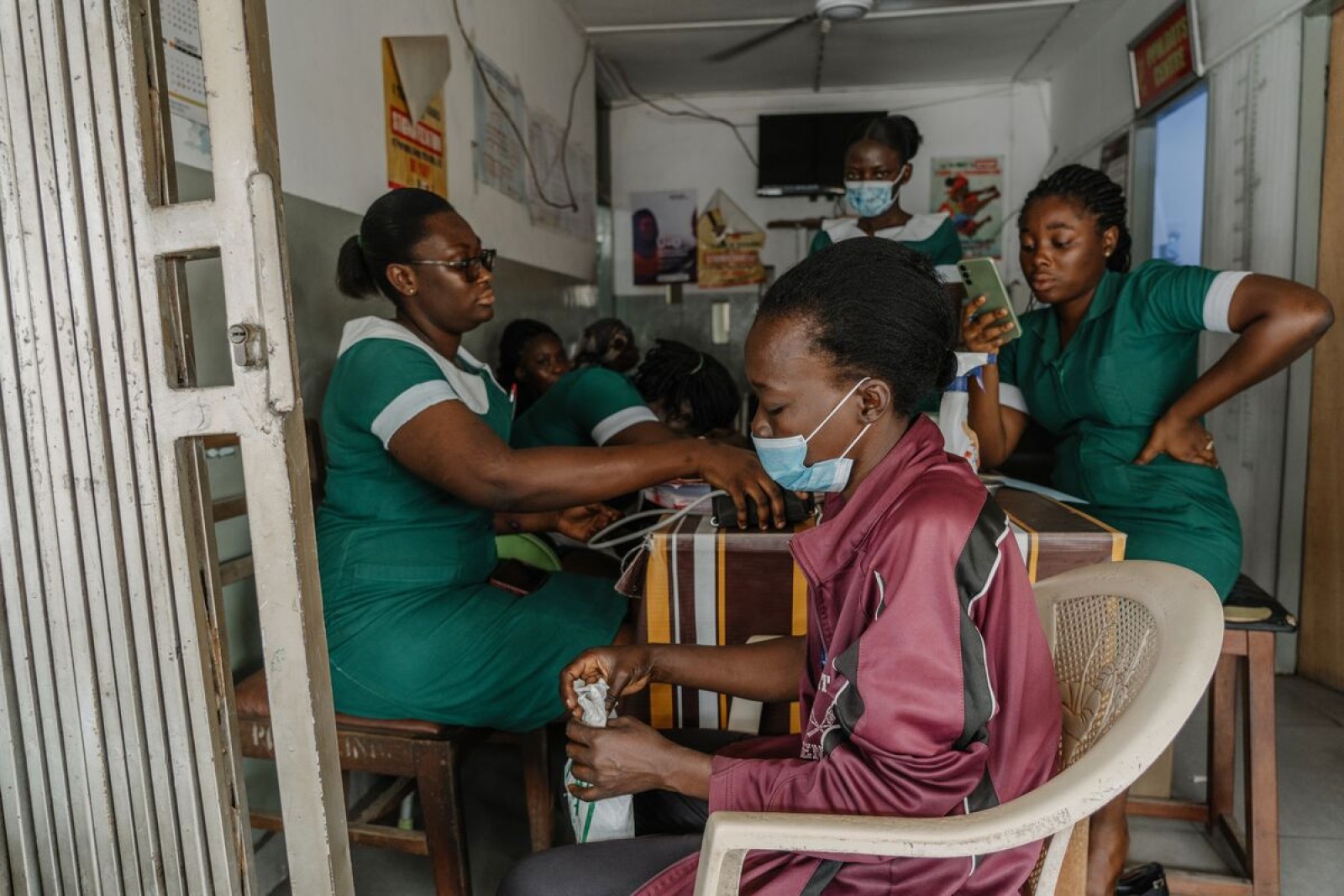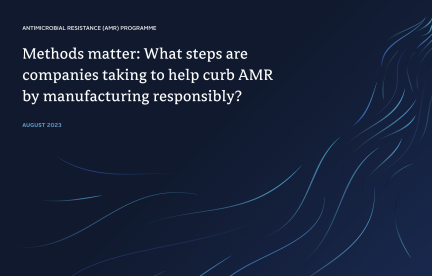The 2021 AMR Benchmark pinpointed opportunities for companies. Did they take them?
For Opportunities related to access, some progress can be seen – especially in expanding product registration and engaging in long-term initiatives to boost availability and affordability.
Despite a handful of acquisitions to expand R&D pipelines, R&D projects targeting priority pathogens and urgent AMR threats are still lacking.
Some positive examples of progress on Opportunities to limit AMR risk from manufacturing, yet minimal movement on transparency of manufacturing practices.
No progress on Opportunities to delink bonuses from antibiotic sales volume; some progress on improving surveillance disclosure and mitigating conflicts of interest.

A core part of the Access to Medicine Foundation’s work is pinpointing specific actions companies can take to make a positive impact on global health. This includes the ways in which they can help curb drug resistance, an issue which has escalated significantly since the World Health Organization (WHO) declared it one of the top ten global health threats in 2019. At the time, projections suggested that annual deaths from antimicrobial resistance (AMR) could reach 10 million by 2050. Today, AMR is already claiming the lives of at least 1.27 million people every year.
In the 2021 AMR Benchmark, tailored ‘Opportunities’ were identified for each of the 17 companies in scope – 8 large research-based pharmaceutical companies (GSK, Johnson & Johnson, MSD, Novartis, Otsuka, Pfizer, Sanofi, Shionogi) and 9 generic medicine manufacturers (Abbott, Alkem, Aurobindo, Cipla, Fresenius Kabi, Hainan Hailing, Sun Pharma, Teva, Viatris). The Opportunities set out for each pharmaceutical company span the areas where they have the greatest potential and responsibility to limit AMR, providing these companies with clear, practical and feasible ways in which they could each maximise their contributions to successfully improve access to antimicrobials and turn the tide of rising drug resistance.
The latest report from the Foundation’s AMR Programme tracks the progress companies have made on these specific Opportunities. By assessing companies’ actions over the last two years, the report serves as an important barometer for determining where successful steps are being taken – and where companies can focus their resources to move forward.
What did the report find?
It is encouraging to see that over the last two years, companies have made some progress on their Opportunities related to access, especially in expanding product registration and engaging in long-term initiatives to boost availability and affordability of antimicrobial products in low- and middle-income countries (LMICs).
If the right antibiotic and antifungal treatments are not available, it can lead to patients being given less-effective alternatives, which allows pathogens with resistance genes to survive and spread. The problem is worst in LMICs, with people living in these countries facing a 50% higher chance of dying from drug-resistant infections than those in high-income countries. Improving access to, and stewardship of, antimicrobials in LMICs is not only critical to saving the lives of the people who live in the hardest hit regions but can prevent superbugs from spreading indiscriminately across the world.
Of nine companies given the Opportunity to expand registration of off-patent/generic medicines in LMICs, six – Abbot, Aurobindo, Cipla, Sanofi, Teva and Viatris – showed varying degrees of progress. Viatris, for instance, filed six products listed on the 2023 WHO Model List of Essential Medicines in an average of two additional LMICs in scope. Teva reports that it has filed five of its essential medicines for registration in at least one additional LMIC since the last Benchmark.
When it comes to antimicrobial products, wider availability is only one side of the coin. It is also critical that access is ‘appropriate’, whereby these essential medicines are made available, affordable and accessible, while being covered by strong stewardship practices. In other words, making sure that antibiotics and antifungals are being used responsibly so they stay effective for as long as possible.
A clear way in which companies can promote appropriate access is to fully decouple sales bonuses from antibiotic sales volumes, which can reduce the risk of mis-selling or over-selling these products – a major concern given that overuse is a major contributor to rising drug resistance. However, of the 11 companies with an Opportunity to fully decouple sales bonuses from sales volumes, not one has done this.
The report finds some positive examples of progress on Opportunities to limit AMR risk from manufacturing, yet there is minimal movement from companies to increase public disclosure of information on company and supplier manufacturing practices. Of 17 companies, 16 were presented with the Opportunity to increase public disclosure on their AMR-focused manufacturing approaches. To date, none of these companies have disclosed audit results or antibacterial discharge levels of their own sites or those of their suppliers.
Overall, R&D projects targeting priority pathogens and urgent AMR threats are still lacking. However, there are a handful of promising projects that could have an impact, especially if access and stewardship plans for these products prove to be robust and comprehensive. One project in Pfizer’s pipeline targets multi-drug resistant gram-negative bacterial infections, such as pneumonia and meningitis, which are found predominantly in hospitals and pose a serious – and often deadly – threat to patients. Shionogi added a novel oral antifungal therapy to its pipeline and acquired antibiotic projects that are being developed not only in IV form, but also in oral form – an option that can provide many practical advantages both for patients and for health systems in LMICs.
What can companies do to make more of an impact?
For every single product or product class in a company's hands, every single action (or inaction) matters, and can have a huge impact on patients' lives. If society is to stand a chance against the rampant rise of tide of drug resistance, companies need to continue focusing on improving appropriate access to effective and safe antimicrobial products and curbing AMR.
“The scale of drug resistance is far larger than previously predicted and requires an even more urgent response. Through this report, we are sharpening our view on current progress and what must happen next so that pharmaceutical companies can maximise their impact and ensure lives are saved.”
Appropriate access to antimicrobials in LMICs is still overlooked as a means to curb AMR. As set out in a previous report from the Foundation’s AMR Programme, and reiterated in this latest report, companies already have the tools that can help reach vulnerable populations – such as equitable pricing policies, patient assistance programmes and technology transfers. Many companies use these tools as part of their access strategies for other products, and they can also use them to create access strategies for antimicrobial products. In developing these strategies, companies can ensure access is provided in an appropriate way by stepping away from sales incentives that stimulate the overselling of antibiotics and antifungals.
To ensure the production of antibiotics does not unintentionally add to AMR, companies can focus on collaborating with suppliers to limit AMR risk throughout the supply chain. In 2023, the Foundation published a report zeroing in on responsible manufacturing practices. It identifies examples of how some companies are developing and maintaining solutions that will help them limit their antibiotic waste more effectively. This report, which includes specific recommendations, can help guide companies to make further progress on their Opportunities identified in the 2021 AMR Benchmark.
Finally, it is vital that companies deepen their investments and engagement in antibacterial and antifungal R&D, particularly for pathogens in the highest threat categories. The superbugs are already here, affecting the lives of many people in LMICs. And these superbugs can quickly also become a global problem. If drastic action is not taken, people across the world will be left vulnerable.
What does the AMR Programme have in the pipeline?
The Foundation will continue to monitor progress and actively engage with pharmaceutical companies to drive impactful change. The AMR Programme will also be publishing a report in 2024 focusing specifically on R&D. Following this, the Foundation will prepare an updated cross-cutting assessment framework that sets out metrics to assess the depth of company action.

Marijn Verhoef
Director of Private Sector Engagement
mverhoef@accesstomedicinefoundation.org
Get in touch


